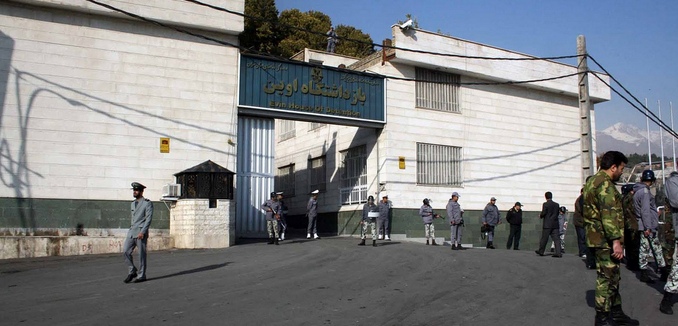An American-Iranian dual national and his wife were arrested by Iran’s Islamic Revolutionary Guard Corps in July, and have been detained ever since without charge or access to a lawyer in Tehran’s Evin Prison, a New-York based human rights group said on Friday.
Before their arrest and detention Karan Vafadari, a Baha’i, and his wife Afarin Niasari ran an art gallery in Tehran. Their case “represents an alarming continuation of a judicial system run by intelligence agencies with no respect for the law and no accountability,” said Hadi Ghaemi, the executive director of the International Campaign for Human Rights in Iran.
In October, representatives of the Baha’i religion accused Iranian President Hassan Rouhani’s government of “ongoing efforts to destroy the Baha’i community.” Since Rouhani took power in 2013, more than 151 Baha’i have been arrested and 388 acts of economic discrimination — including threats, intimidation and the closing of Baha’i-owned businesses — have been documented, according to the community. Thousands of Baha’i have also been denied entry into universities, while 28 have been expelled on the basis of their religion, which has been outlawed by the Islamic Republic.
Iran also has a history of arresting dual nationals, with at least six held in July. According to Reuters, this comprised “the highest number of Iranians with dual-nationality detained at one time in recent years to have been acknowledged.” One more dual national, a former member of the Iranian nuclear negotiating team, was arrested in August. Many analysts believe that Iran is “seeking concessions from the West in exchange for releasing” dual nationals, the Associated Press wrote that month.
Other dual nationals currently detained in Iran include British-Iranian businessman Kamal Foroughi and Nazanin Zaghari-Ratcliffe, a British charity worker who was sentenced to five years in prison in October. That same month, Iranian-American Siamak Namazi, a businessman who advocated for closer ties between the U.S. and Iran, was sentenced to ten years in prison along with his 80-year-old father.
Also in October, Reza Shahini, a 46-year-old from San Diego who was arrested by Iranian Revolutionary Guard Corps in July, was sentenced to 18 years in prison for espionage related charges and “collaborating with a hostile government.” In September, Iran announced that U.S. resident Nizzar Zakka, an internet freedom activist who was invited to Iran by one of its vice-presidents, was sentenced to 10 years in prison.
Canadian-Iranian scholar Homa Hoodfar, who was arrested earlier this year when she returned to Iran to see her family, was released at the end of September, on the same day that Iran announced that it was holding talks with the Canadian government about reopening embassies in each other’s countries. Hoodfar told CBC News after returning to Canada that her interrogators “threatened to send my dead body back to Canada,” and that she was originally arrested for “dabbling in feminism” before having her charges arbitrarily changed to helping a hostile government subvert national security.
Hoodfar’s experience echoed that of Jason Rezaian, the Washington Post reporter who was released in January along with four other American hostages held in Iran (Rezaian is also featured in the video released by Mizan). Rezaian and two family members have filed a federal lawsuit against Iran, claiming that Rezaian was taken hostage and tortured in order to “extort” concessions from the United States during nuclear negotiations. The suit also alleges that Rezaian “suffered such physical mistreatment and severe psychological abuse in Evin Prison that he … will require specialized medical and other treatment for the rest of his life.”
In Why Does Iran Keep Taking American Hostages?, published in the September 2015 issue of The Tower Magazine, Iran expert Ali Alfoneh described the regime’s detainment of foreign and dual-nationals as “a perfectly normal procedure and political practice in the Islamic Republic. That has been the case since the first day of the revolution and continues until today.”
[Photo: بزفوتو Iran / Flickr ]




